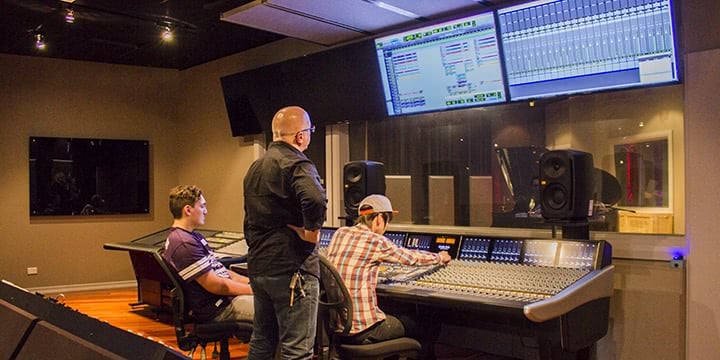There’s been a bit of role reversal going on over at Hunter TAFE in Newcastle.
In preparation for the delivery of the Regional Music Institute’s brand new toy, a state of the art mixing desk, senior sound production teacher Lee Rolfe had to go back to school himself.
“Before we got the new mixing desk, we all got given the instruction book for it,” Rolfe says. “I was reading it for a month, and I [thought], ‘I’m pretty much on this, I’ll be right.’ But when it rocked up, I sat down at it and I went, ‘Yeah, I’ve got no idea.’” He laughs. “You know what I mean? You can read all you like. But you’ve got to just sit at the actual thing sometimes. People learn in different ways. I keep going back to the instruction book, but then I’ll sit down at the desk for a day as well. You gotta do both.”
One can’t blame Rolfe, an industry figure who has been playing in bands since the early ’90s, for trying to spend as much time as possible with this cutting-edge piece of equipment. The desk now represents the jewel in the Regional Music Institute’s crown, and Rolfe talks about it with a distinct tone of reverence. “It’s an SSL desk,” he explains. “It’s the SSL Duality. It’s a 48-channel analogue and digital desk, and it’s the centrepiece of the studio – the big mama of everything.”
Even more excitingly, it’s not the only new piece of equipment the TAFE has purchased recently for its audio and production students. “Over the last 18 months we’ve been buying classic pieces of gear,” Rolfe says. “Some of it might be 50 years old. You might find all these bits of equipment we’ve [been buying] at studios all over the world, but in most cases, you’re not going to be able to find all these bits in the one studio. We’ve rounded up a whole bunch of classic pieces and put them in one place – it’s just great.”
This combination of vintage and modern equipment means the freshly assembled studio will provide students with a rounded education, and a real insight into what an actual recording studio looks and feels like. “What we have now is international standard,” says Rolfe. “Our students can come in now and learn on this gear and then walk into any studio in the world and be comfortable.
“In the entry-level course, they mostly just work on a computer, like a workstation that most of them could have at home. So they start out learning how to use the gear they have at home better, and then as they start stepping up to the diploma and the advanced diploma, then the gear steps up, and by the time they finish here they’re on international world-class gear.”
As it stands, Hunter TAFE provides an education based in the real world. The sound production courses are not about getting students mired in theory, or overloading them with a range of stiff facts that will have little relevance in practice – they’re about getting them work.
“’Cause we’re a vocational education system … we are about making people job-ready,” says Rolfe. “We really are about getting everybody hands-on. All the teachers work in the industry. We’re not just someone who’s learnt at university and only taught. To be a teacher here you’ve got to have experience and still constantly work in the industry.”
Ultimately, the last thing Rolfe wants is his students to feel lost the moment they step into the real world. “You wouldn’t want them walking into a studio, seeing a desk and going, ‘Oh shit, what am I going to do with that?’” he chuckles.
[Regional Music Institue photo by Deborah Landy]
Hunter TAFE’s Regional Music Institute is located at RMI Studio, Hunter TAFE Newcastle Campus. For more info head to hunter.tafensw.edu.au.


































